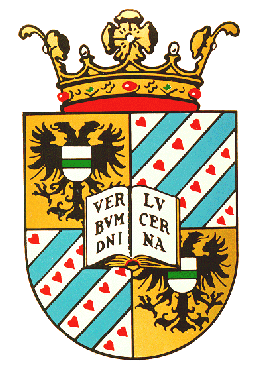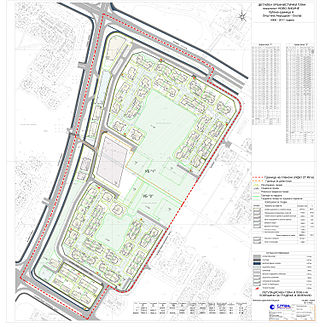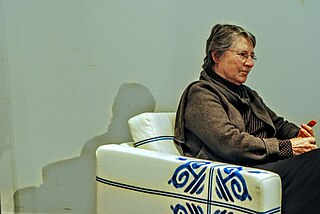Regional science is a field of the social sciences concerned with analytical approaches to problems that are specifically urban, rural, or regional. Topics in regional science include, but are not limited to location theory or spatial economics, location modeling, transportation, migration analysis, land use and urban development, interindustry analysis, environmental and ecological analysis, resource management, urban and regional policy analysis, geographical information systems, and spatial data analysis. In the broadest sense, any social science analysis that has a spatial dimension is embraced by regional scientists.
The Blekinge Institute of Technology is a public, state funded Swedish institute of technology in Blekinge with 5,900 students and offers about 30 educational programmes in 11 departments at two campuses located in Karlskrona and Karlshamn.

The University of Groningen is a public research university of more than 30,000 students in the city of Groningen in the Netherlands. Founded in 1614, the university is the second oldest in the country.

The Aristotle University of Thessaloniki is the second oldest tertiary education institution within Greece. Named after the philosopher Aristotle, who was born in Stageira, about 55 km east of Thessaloniki, it is the largest university in Greece and its campus covers 230,000 square metres in the centre of Thessaloniki, with additional educational and administrative facilities elsewhere.

Spatial planning mediates between the respective claims on space of the state, market, and community. In so doing, three different mechanisms of involving stakeholders, integrating sectoral policies and promoting development projects mark the three schools of transformative strategy formulation, innovation action and performance in spatial planning

The Polytechnic University of Turin is the oldest Italian public technical university. The university offers several courses in the fields of Engineering, Architecture, Urban Planning and Industrial Design, and is consistently ranked as one of the best universities in Italy and in the world. As of 2024, it is ranked 28th worldwide for Mechanical Engineering, 22nd for Petroleum Engineering, 21st for Architecture and is among the top 100 (52nd) engineering and technology universities in the world.

The University of the Azores, or commonly abbreviated as UAc, is the only public university in the Autonomous Region of the Azores. It was founded on January 9, 1976, two years after the Carnation Revolution that ended several decades of dictatorship in Portugal, but before the Portuguese Third Republic was institutionalized, along with the region's autonomy. The university is a public institution dependent on the Ministry of Science, Technology and Higher Education and was established in order to advance sustainable development and higher education in the Azores.

Music education is a field of practice in which educators are trained for careers as elementary or secondary music teachers, school or music conservatory ensemble directors. Music education is also a research area in which scholars do original research on ways of teaching and learning music. Music education scholars publish their findings in peer-reviewed journals, and teach undergraduate and graduate education students at university education or music schools, who are training to become music teachers.
Regional economics is a sub-discipline of economics and is often regarded as one of the fields of the social sciences. It addresses the economic aspect of the regional problems that are spatially analyzable so that theoretical or policy implications can be the derived with respect to regions whose geographical scope ranges from local to global areas.
Frank Moulaert is Professor of Spatial Planning at the Department of Architecture, Urban Design and Regional Planning at Catholic University of Leuven. He is Director of the Urban and Regional Planning Research Group and chairs the Leuven Space and Society Research Centre at the University. He is also a Visiting Professor at the School of Architecture, Planning and Landscape, Newcastle University.

Patsy Healey was a British urban planner. She was professor emeritus at Global Urban Research Unit in the School of Architecture, Planning & Landscape, at Newcastle University. She was a specialist in planning theory and practice, with a particular focus on strategic spatial planning for city regions and in urban regeneration policies. She was Senior Editor of Planning Theory and Practice journal, jointly published by TandF and the RTPI.
The European Spatial Development Planning or ESDP-Network seeks to promote education, research and professional training in spatial planning across European countries, in collaboration with many partners in other regions of the world. To this purpose it considers planning as a process and a change agenda.
Cliff Hague is a British town planning practitioner and Emeritus Professor of Planning and Spatial Development at Heriot-Watt University, Edinburgh. He was educated at Alfred St Elementary School in Manchester, North Manchester Grammar School for Boys (1955–63) and Magdalene College Cambridge (1963–66) where he read Geography, then at the University of Manchester (1966–68) where he was awarded a post-graduate Diploma in Town Planning.

TerrSet is an integrated geographic information system (GIS) and remote sensing software developed by Clark Labs at Clark University for the analysis and display of digital geospatial information. TerrSet is a PC grid-based system that offers tools for researchers and scientists engaged in analyzing earth system dynamics for effective and responsible decision making for environmental management, sustainable resource development and equitable resource allocation.
Simin Davoudi FAcSS is Professor of Environmental Policy and Planning at Newcastle University. She is Past President of the Association of European Schools of Planning (AESOP) and, as coordinator of the Planning Research Network, advised the Department of Communities and Local Government on its research priorities until 2007. Currently, she is a member of the DCLG Expert Panel on Housing market and Planning, and is expert advisor for the DG Environment of European Commission for Urban Environment.

A 2001 ESPIN metropolitan area was defined as consisting of an urban area, conurbation or agglomeration, together with the surrounding area to which it was closely economically and socially integrated through commuting.

Dance education is a practice whereby students are taught a broad understanding of dance as a form of art and who are trained professionally in many different genres of dance. Dance education consists of specialized dancers who conduct original research for teaching others how to dance. Currently, dance itself is considered an allied form of art and music, thus dance in formal education is closely knit with these disciplines.
The European Business History Association (EBHA) is an academic association devoted to business history in Europe. It holds annual congresses and a bi-annual doctoral summer school. It is registered as a Scottish charity. Its constitution states its objectives as "to advance the education of the public concerning all aspects of the history of business and management in Europe and to promote research into all such aspects". Its aim is the organisation of conferences and seminars, the publication of a newsletter and other material girls, the encouragement of research in all aspects of business history, and specifically the promotion of collaborative projects based in several European countries such as The Performance of European Business in the 20th Century project per instance. The association was established to enhance inter-European contacts and promote extra-European links among business historians, to encourage the exchange of business history graduate students and to promote teaching and interest in all such aspects.

Climate change education (CCE) is education that aims to address and develop effective responses to climate change. It helps learners understand the causes and consequences of climate change, prepares them to live with the impacts of climate change and empowers learners to take appropriate actions to adopt more sustainable lifestyles. Climate change and climate change education are global challenges that can be anchored in the curriculum in order to provide local learning and widen up mindset shifts on how climate change can be mitigated. In such as case CCE is more than climate change literacy but understanding ways of dealing with climate

Matthew Carmona is an architect, planner and researcher based in the United Kingdom. His research focuses on the process of design governance and management of Public Space. He has taught at the University of Nottingham and The Bartlett, the latter since 1998.












